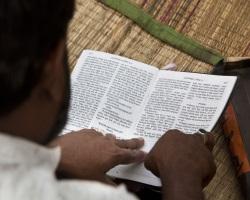Zaman tells me the songs capture his spiritual journey and are a testament to the freedom he found in Christ. Zaman was once a member of a fundamentalist Islamic political party, the imam in a mosque and a teacher in a Muslim school.
Now, he’s a Christian church planter.
As an imam, the call to prayer was the only song he was allowed to sing. The call, made up of verses from the Quran, is broadcast from the local mosque to beckon Muslims to pray. Now that he’s a believer, he has the freedom to sing.
His voice is soothing and melodic—an invitation to lapse into memories of God’s fingerprints on my life. “Oh my Lord, please give me truth. Please give me Your heart, give me soul and heart and my life will go the straight way,” Zaman sings, with one hand raised.
After the vibrato of the last note ends, Zaman flips to the first page. His eyes scan the hand-written lines. Zaman’s voice rises in pitch when he talks about his songs.
The sky, rain and moon are important symbols in Bangladeshi culture. Many Bangladeshis are farmers and depend on rain for their crops to grow. The crescent moon is also a symbol of Islam.
The song came to him in a dream, the night after he shared the gospel through a mosque’s loudspeaker and subsequently was run out by an angry mob.
After Zaman finished singing, I asked to hear the Muslim call to prayer—to hear the contrast between his former and current life. He closed his eyes and plugged his ears with his fingers. He told me afterward that all imams do this to help them concentrate.
As a former imam, Zaman has memorized the entire Quran.
The call to prayer is beautiful and eerie at the same time. It’s considered an art form. The verses flow from his mouth. His chest heaves; his diaphragm is trained for this. His voice rises in pitch and volume. Arabic fills the room, and I fear those in the hall will hear. The last thing I want to happen is for him to get in trouble.
“God is great. God is one.”
When he sang his worship songs, he was lively and full of joy. When he recited the verses of the Quran, he was mournful and serious. As the song ended, he opened his eyes, unplugged his ears and sighed in relief. This is what he did five times a day for years. He said this is the first time in 12 years he’s given the call to prayer. Now, his lips sing only songs of joy and deliverance.
It’s these songs of joy that a growing number of believers in Bangladesh are singing.
Jot down the story of your journey of deliverance, and put it to the tune of a worship song. The next time you worship, pray for the Bangladeshis who are finding joy in song.
*Name has been changed. Learn more at OneLifeMatters.org.




